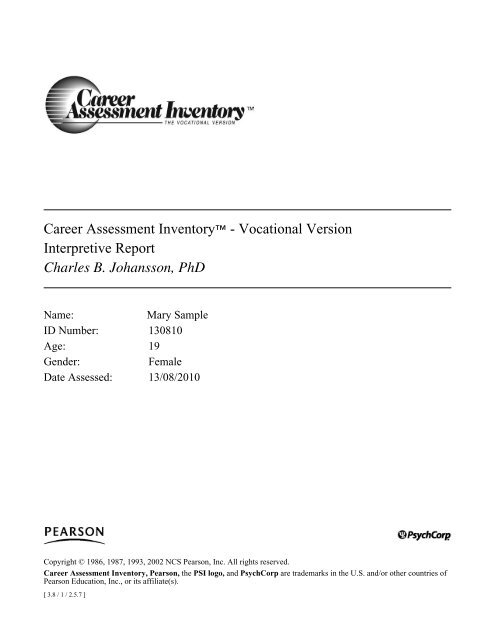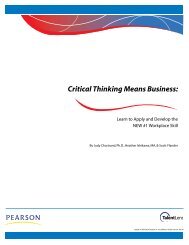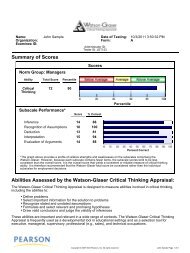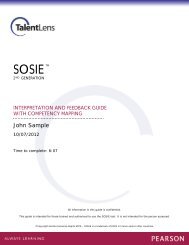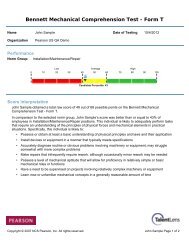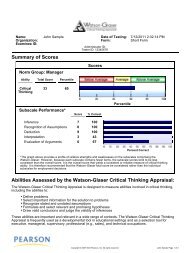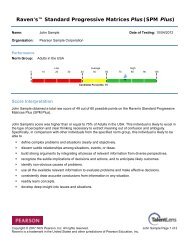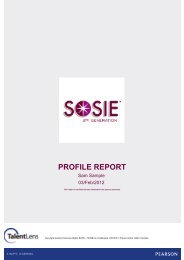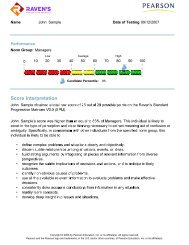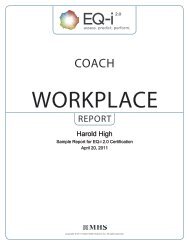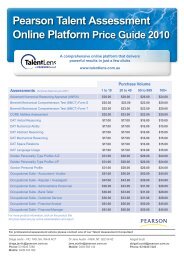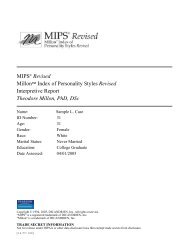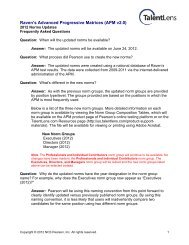CAI Vocational Sample Interpretive Report - TalentLens
CAI Vocational Sample Interpretive Report - TalentLens
CAI Vocational Sample Interpretive Report - TalentLens
You also want an ePaper? Increase the reach of your titles
YUMPU automatically turns print PDFs into web optimized ePapers that Google loves.
Career Assessment Inventory - <strong>Vocational</strong> Version<strong>Interpretive</strong> <strong>Report</strong>Charles B. Johansson, PhDName: Mary <strong>Sample</strong>ID Number: 130810Age: 19Gender: FemaleDate Assessed: 13/08/2010Copyright © 1986, 1987, 1993, 2002 NCS Pearson, Inc. All rights reserved.Career Assessment Inventory, Pearson, the PSI logo, and PsychCorp are trademarks in the U.S. and/or other countries ofPearson Education, Inc., or its affiliate(s).[ 3.8 / 1 / 2.5.7 ]
Career Assessment Inventory - <strong>Vocational</strong> Version <strong>Interpretive</strong> <strong>Report</strong>ID 130810 Page 2INTRODUCTIONThe important process of choosing a career requires that several factors be considered. Your abilitiesare essential to consider in deciding on a job, and your interests, personal preferences, and lifeexperiences also play an important part in helping you select an occupation in which you will besatisfied. Research has shown that individuals have a better chance of being satisfied in an occupation iftheir interests are similar to those of people already employed in that occupation. The results presentedin this report are based on your like and dislike answers to the items on the Career AssessmentInventory. These results will point out areas where your interests do and do not match those of peoplewho are working in different occupations. Therefore, the results can help you understand how yourpreferences fit into the world of work.These results are measures of only your interests, not of your abilities or aptitudes. For example, yourresults may indicate that you would like the daily routine of artists and that you like artistic activities,but the results will not indicate if you have the talent to be an artist.Your results can give you some useful information about yourself, but do not expect miracles. Althoughthe scores may seem to tell you nothing more than you already know about yourself, they will permityou to see how the strengths of your interests compare to the average interests of other people. In somesections of the report you will find page references for the Occupational Outlook Handbook (OOH)2004/2005 version. This book can be found in your local library and provides information about recenttrends in employment opportunities and educational requirements for various occupations. These resultsare designed to be an aid to help you reach the career decision that will be most satisfying to you.
Career Assessment Inventory - <strong>Vocational</strong> Version <strong>Interpretive</strong> <strong>Report</strong>ID 130810 Page 3GENERAL THEME SCALESInterests can be grouped into six categories, and each of these categories can be described by a generaltheme. Below are your scores on the six General Theme scales and a graph on which your scores areplotted. Most people have scores between 43 and 57 on these scales so this range, 43-57, is called theaverage range of scores. Scores below 43 are considered as indicating low interest in a theme. Scoresabove 57 are considered as indicating high interest in a theme. Your scores are plotted using asterisks. Ashaded bar shows the average score range for your sex. The average score range for the opposite sex isnoted in the final column of this chart.RIASECScaleRealisticInvestigativeArtisticSocialEnterprisingConventionalStd.Score545458574645VeryLow (35)LowAverageHigh(43) (57) (65)** * * *VeryHighAverageOpp. Sex48-6045-5841-5441-5444-5741-53Descriptions follow for each of the themes. These are ideal descriptions of the interests andcharacteristics related to each theme, so all the descriptions may not fit any one person exactly. Fewpeople have a high score on just one theme and low scores on the others. Most people score high on twoor three themes and thus they share some of the descriptions of more than one theme. Some people scorelow on all themes, which indicates that strong patterns of interests as measured by these themes have notbeen formed yet. This is particularly true for young people. Generally, the higher your score on a theme,the more characteristics you share with that particular theme.A-Theme Your score of 58 on the Artistic theme indicates you have interests similar to people whohave an artistic bent and prefer jobs that allow them to express themselves by creating works of art.They usually like to work alone and tend to wrap themselves up in what they are doing. Occupationssuch as artist, author, cartoonist, singer, poet, interior designer, baker, art appraiser, caterer, danceteacher, floral designer, graphic designer, photojournalist, and technical writer reflect this theme. Yourscore for this theme suggests that the occupations listed under ARTISTIC in the Additional Occupationssection at the end of this report may also appeal to you.
Career Assessment Inventory - <strong>Vocational</strong> Version <strong>Interpretive</strong> <strong>Report</strong>ID 130810 Page 4S-Theme Your score of 57 on the Social theme indicates you have interests somewhat similar topeople who have a strong concern for others and like to help others solve personal problems. They seethemselves as cheerful and popular, and they usually are good leaders. They prefer to solve problems bytalking things out, and they get along well with many types of people. Some occupations preferred bythese people are social worker, nurse, recreation leader, camp counselor, teacher, art therapist, cruisedirector, equal opportunity representative, geriatric counselor, juvenile parole officer, nurse-midwife,occupational therapist, playground director, and speech instructor. Your score for this theme suggeststhat the occupations listed under SOCIAL in the Additional Occupations section at the end of this reportmay also appeal to you.R-Theme Your score of 54 on the Realistic theme indicates you have interests somewhat similar topeople who like to repair or build things. Generally, they like to work outdoors rather than indoors. Theyhave good physical skills, are practical and rugged, and would rather work with things than with people.They prefer occupations such as mechanic, skilled tradesperson, forester, farmer, airplane navigator,broadcast technician, food scientist, optician, radio or television engineer, radiologic technician, orspecial effects designer. Your score for this theme suggests that the occupations listed underREALISTIC in the Additional Occupations section at the end of this report may also appeal to you.I-Theme Your score of 54 on the Investigative theme indicates you have interests somewhat similarto people who enjoy working with words and ideas to find original and creative solutions to scientificproblems. They prefer to work alone, and they usually enter scientific occupations such as laboratoryresearch worker, medical technician, scientist, mathematician, computer programmer, aircraft testengineer, audiologist, civil engineer, computer help desk representative, market research analyst,oceanographer, pathologist, quality control inspector, research analyst, or geologist. Your score for thistheme suggests that the occupations listed under INVESTIGATIVE in the Additional Occupationssection at the end of this report may also appeal to you.E-Theme Your score of 46 on the Enterprising theme indicates you have interests somewhat similarto people who are skillful in using words to persuade people. Often they are in sales work. They seethemselves as energetic, enthusiastic, adventurous, and confident. They enjoy occupations such as sales,management, buying, politics, merchandising, business, antique dealer, convention manager, customerservice manager, director of research and development, economic development officer, labor arbitrator,theater manager, and travel bureau manager.C-Theme Your score of 45 on the Conventional theme indicates you have interests somewhat similarto people who prefer activities and jobs in which they know exactly what is expected of them. Theywork well in large offices, and usually do not seek leadership jobs. They describe themselves asconventional, stable, well-controlled, and dependable. They prefer jobs in the business world such asbank teller, bookkeeper, accountant, computer operator, secretary, computer security expert, creditanalyst, forms analyst, insurance underwriter, intelligence agent, medical records clerk, policedispatcher, purchasing agent, or securities compliance expert.
Career Assessment Inventory - <strong>Vocational</strong> Version <strong>Interpretive</strong> <strong>Report</strong>ID 130810 Page 5BASIC INTEREST AREA SCALESSummarized below are your results on 22 Basic Interest Area scales. They show the strength of yourinterests in a variety of specific areas. The Basic Interest Area scales are grouped according to theirrelationship with the six General Theme scales (GT). An average score falls between 43 and 57 on eachscale. On some of the scales, females and males respond somewhat differently. Your scores are plottedusing asterisks. A shaded bar shows the average score range for your sex. The average score range forthe opposite sex is noted in the final column of this graph.Basic Interest AreaRealistic ThemeMechanical/FixingElectronicsCarpentryManual/Skilled TradesAgricultureNature/OutdoorsAnimal ServiceInvestigative ThemeScienceNumbersArtistic ThemeWritingPerforming/EntertainingArts/CraftsSocial ThemeSocial ServiceTeachingChild CareMedical ServiceReligious ActivitiesEnterprising ThemeBusinessSalesConventional ThemeOffice PracticesClerical/ClerkingFood ServiceStd.Score53505551545853594259545657565959464947543859VeryLow(35)*Low*AverageHigh(43) (57) (65)********** ****** * **VeryHighAverageOpp. Sex49-6149-6147-6048-6147-6043-5644-5645-5844-5741-5441-5539-5241-5542-5541-5341-5442-5643-5643-5841-5141-5339-52
Career Assessment Inventory - <strong>Vocational</strong> Version <strong>Interpretive</strong> <strong>Report</strong>ID 130810 Page 6Your highest scores in the basic interest areas are listed below as well as a description of the kinds ofactivities and occupations related to each area. The higher your score on a scale, the more you probablylike the activities that are a part of that scale. In general, these areas probably can be sources ofsatisfaction in your life. Even if they are not part of the occupation that you choose, they can be areas ofleisure-time satisfaction. If you can choose a career that is related to your highest scores, you probablywill find it rewarding.SCORE BASIC INTEREST59 ScienceYour high score on this scale indicates you like reading science fiction stories and books on science andstudying biology (plants and animals), astronomy (the stars), physics, and geology (rocks and fossils).People who like scientific activities and occupations have high scores on this scale.59 WritingYour high score on this scale indicates you like expressing yourself by writing poetry, reporting fornewspapers, and writing stories for magazines. Author, reporter, and playwright are examples ofoccupations related to this area.59 Child CareYour high score on this scale indicates you like assisting in a nursery school, baby-sitting. Helpingchildren to read or spell or play are interests related to being a nursery school teacher, elementaryteacher, teacher aide, or child development specialist.59 Medical ServiceYour high score on this scale indicates you like helping people by giving medical assistance. Workingin a hospital, being a nurse, taking the pulse of someone, studying first aid, and helping people at thescene of an accident are of interest to people scoring high on this scale, such as operating roomtechnician, nurse, nurse aide, and other hospital occupations.
Career Assessment Inventory - <strong>Vocational</strong> Version <strong>Interpretive</strong> <strong>Report</strong>ID 130810 Page 7OCCUPATIONAL SCALESThe Occupational scales indicate the degree of similarity between your interests and those of peopleemployed in various occupations. People who enter an occupation for which they have similar scorestend to remain in that occupation and are more satisfied than if they enter an occupation for which theyhave dissimilar scores. You should not assume that because you have a high score on a scale, however,that you will be good in that occupation. Other factors, such as ability, past life experiences, andeducation are also important considerations. But you can interpret high scores as indicating that youhave similar interests with people actually in that occupation. You should also consider occupations forwhich your scores are considerably higher than the average for your sex even if your scores are not inthe very similar or similar range.About two-thirds of the workers in an occupation have scores of 45 and higher on their own occupationscales. Most people not in the occupation have scores in the mid-range, 26-44. Scores of 25 and lowerindicate that your interests do not match those of workers in an occupation.Your scores on the Occupational scales are organized and presented according to their relationship withthe six General Theme scales. Your scores for each Occupational scale are indicated by an asterisk. Ashaded bar shows the average score range on each scale for people of your sex not employed in thatoccupation. The average score range for the opposite sex is noted in the final column. Each occupationaltitle has a corresponding letter code indicating the important theme interest characteristics for that scale.The first letter indicates the strongest relationship and any additional letters indicate less importantinterest characteristics from other themes.On the next pages are your scores for each of the Occupational scales.
Career Assessment Inventory - <strong>Vocational</strong> Version <strong>Interpretive</strong> <strong>Report</strong>ID 130810 Page 8Occupational ScalesRealistic ThemeAircraft Mechanic (RI)Auto Mechanic (R)Bus Driver (R)Camera Repair Tech (RI)Carpenter (R)Conservation Officer (RI)Dental Lab Technician (RI)Drafter (RI)Electrician (R)Emergency Med Tech (RS)Farmer/Rancher (R)Firefighter (R)Forest Ranger (RI)Hardware Store Mgr (RC)Janitor (R)Machinist (R)Mail Carrier (RC)Musical Instrmnt Repair (RIA)Navy Enlisted (RI)Orthotist/Prosthetist (RI)Painter (R)Park Ranger (RI)Pipefitter/Plumber (R)Police Officer (RS)Printer (R)Radio/TV Repair (RI)Security Guard (RC)Sheet-Metal Worker (R)Telephone Repair (RI)Tool/Die Maker (RI)Truck Driver (R)Veterinary Tech (RI)Investigative ThemeChiropractor (IS)Computer Programmer (I)Dental Hygienist (ISA)Electronic Technician (IR)Math/Science Teacher (I)Medical Lab Technician (IR)Radiologic Technician (IRS)Respiratory Ther Tech (IRS)Surveyor (IR)Artistic ThemeAdvertising Artist/Writer (A)Advertising Executive (AE)Author/Writer (A)Counselor-Chem Dep (ASE)Interior Designer (A)Legal Assistant (AE)Librarian (AI)Musician (A)Newspaper <strong>Report</strong>er (AE)Photographer (A)Piano Technician (ARI)Std.Score2115192620304030152828262110281115253239353225312682110271414284821401729324443163339324524333421283928VeryDissimilar Mid-RangeSimilarDiss.(15) (25) (44) (54)********************* ************** * ************ ***VerySim.AverageOpp. Sex20-3319-3226-3718-3121-3214-2729-3920-3219-3222-3427-3622-352-1915-2826-3715-2920-3224-3526-3822-3522-3315-2822-3428-3923-3418-3126-3513-2827-3811-2722-3212-2420-3223-3513-2518-3123-3426-3726-3723-3618-3014-2524-3512-2325-378-1928-3823-3411-268-2314-2820-32
Career Assessment Inventory - <strong>Vocational</strong> Version <strong>Interpretive</strong> <strong>Report</strong>ID 130810 Page 9Occupational ScalesSocial ThemeAthletic Trainer (SR)Child Care Assistant (SA)Cosmetologist (SA)Elem School Teacher (SA)Licensed Practical Nurse (SC)Nurse Aide (SC)Occupational Ther Asst (SR)Operating Room Tech (SIR)Physical Ther Asst (S)Registered Nurse (SI)Enterprising ThemeBarber/Hairstylist (ER)Buyer/Merchandiser (EAS)Card/Gift Shop Mgr (E)Caterer (ES)Florist (E)Food Service Manager (ECS)Hotel/Motel Manager (ECS)Insurance Agent (ESC)Manufacturing Rep (E)Personnel Manager (EAS)Private Investigator (EA)Purchasing Agent (EC)Real Estate Agent (E)Reservation Agent (EAS)Restaurant Manager (ECS)Travel Agent (EC)Conventional ThemeAccountant (CE)Bank Teller (CE)Bookkeeper (C)Cafeteria Worker (C)Court <strong>Report</strong>er (CE)Data Entry Operator (CE)Dental Assistant (CS)Exec Housekeeper (CSE)Medical Assistant (CS)Pharmacy Technician (CS)Secretary (C)Teacher Aide (CS)Waiter/Waitress (CSE)Std.Score373831433928413742422127223615342323203636331020362511162424292836272929262934VeryDiss.(15)****Dissimilar***Mid-RangeSimilar(25) (44) (54)***** ** *** *** ***** ************VerySim.AverageOpp. Sex20-3220-294-1423-3523-338-2017-2924-3418-3120-327-1622-3226-3718-2919-2821-3025-3622-3320-3028-3925-3630-4020-3125-3523-3222-3225-3617-2725-3513-2124-3225-3522-3123-3213-2425-3323-3015-2522-30
Career Assessment Inventory - <strong>Vocational</strong> Version <strong>Interpretive</strong> <strong>Report</strong>ID 130810 Page 10You may have noticed some inconsistencies among your scores. These puzzling results can usually beexplained by carefully considering what the different types of Career Assessment Inventory scales aredesigned to measure. For example, suppose you have a high score on the Agriculture (Basic InterestArea) scale and a low score on the Farmer/Rancher (Occupational) scale. Such discrepancies occurbecause the Occupational scales are more complex than the Basic Interest Area scales. The Occupationalscales contain items dealing with all the ways people in those occupations differ from people in general,not just job-related differences. The Farmer/Rancher scale includes items indicating a dislike of artisticpursuits and a preference for mechanical activities as well as agricultural interests. In contrast, items onthe Agriculture scale are all related to a preference for agricultural activities like planting and trimmingtrees. The assistance of a professional counselor may be especially helpful as you try to make sense ofany such discrepancies that you may find in this report.Your highest scores appeared on the following Occupational scales and indicate the greatest degree ofsimilarity between your answers and those of workers in these careers. References are given for theOOH (2004/2005) edition and the Standard Occupational Classification (SOC). The SOC reference isan occupational code used by the O*NET database of occupational information. (www.onetcenter.org)SCORE OCCUPATIONAL SCALE OOH SOCPAGE(S) CODE(S)48 Chiropractor 271 29-1011Chiropractors diagnose and treat diseases and abnormalities of the body that are believed to be causedby interference with the nervous system. They manipulate the spine or another involved body area. Twoyears of college followed by four years of chiropractic training are required for licensing as achiropractor. Employment of chiropractors is expected to grow faster than the average for alloccupations through 2012.45 Counselor-Chemical Dependency 188 21-1011Chemical dependency counselors help chemically dependent people develop and maintain a life-stylewithout alcohol or drugs. A desire to help others is important in this occupation. A four-year collegedegree is usually necessary, as is a strong background in psychology, education, and social work.Employment is expected to grow faster than average through 2012.44 Radiologic Technician 321 29-2034Radiologic technologists operate X-ray equipment to diagnose and treat diseases. They may preparechemical mixtures for a patient to swallow to make specific organs show up clearly in an X-ray exam.They position patients and operate the equipment to make radiographs that are interpreted by aphysician. Training programs vary from two to four years in length. Employment opportunities areexpected to expand faster than the average for all occupations through 2012, but competition for jobswill be intense.
Career Assessment Inventory - <strong>Vocational</strong> Version <strong>Interpretive</strong> <strong>Report</strong>ID 130810 Page 12ADMINISTRATIVE INDICESThe following are Administrative Indices and Special Scales. Data for Activities, School Subjects, andOccupations indicate your response percentages -- like very much (LL), like somewhat (L), indifferent(I), dislike somewhat (D), and dislike very much (DD) -- for the three sections of the inventory. TotalResponses indicates the number of items you answered on the inventory. Descriptions of the otherscores are given below.ActivitiesSchool SubjectsOccupationsResponse PercentagesLL L I D DD131412629411521 35 30 7 78224Special ScalesTotal ResponsesFine Arts-MechanicalOccupational Extroversion/IntroversionEducational OrientationVariability of InterestsScore30549395665Your score on the Fine Arts-Mechanical scale indicates an overall preference for some fine artsactivities and for some mechanical activities. Generally, people in skilled trades occupations tend tohave much higher scores, while people in social-service and creative occupations tend to have muchlower scores.Your low score on the Occupational Extroversion-Introversion scale indicates that you would probablyprefer working with people more than with just things. People in sales and social-service occupationstend to have low scores, while people who like to work alone, such as technicians and skilled tradesgroups, tend to have very high scores on this scale.Your high score on the Educational Orientation scale indicates that your interest preferences are similarto individuals who graduate from a liberal arts college with a baccalaureate or advanced college degree.These individuals have a strong liking for many creative, mathematic, aesthetic, and scientific activitiesand enjoy course work involved in their studies.Your score on the Variability of Interests scale indicates that you like many different types of activities.Your score is higher than the average range for most people and suggests that you find a wide variety ofactivities rewarding.
Career Assessment Inventory - <strong>Vocational</strong> Version <strong>Interpretive</strong> <strong>Report</strong>ID 130810 Page 13COMMENTSYour answers to the Career Assessment Inventory have produced scores on a wide range of generalinterests and specific occupational scales. You should not be totally set on a single occupation for whichyour score is high, at least not at an early age. Nor should you be concerned if none of your scores isespecially high. A lack of strong interest patterns is not unusual, particularly among young people.Furthermore, no single inventory can hope to cover all possible occupations. In the world of work arehundreds of specialties and related careers, and you should use your scores as a guide for further careerexploration and thinking. Your scores indicate that you should also investigate some of the additionaloccupations listed under Realistic, Investigative, Artistic, and Social in Additional Occupations at theend of this report.Research with interest inventories such as the Career Assessment Inventory indicates that these types ofscores are very stable. Adults show very little change in their scores over the years. High school studentsand young adults show some change after two or three years and more change after ten or fifteen years.Each person is unique, and no inventory can accurately predict the diversity among various individuals.Thus, the results presented to you should be used as guidelines in helping you to better understand yourcareer and vocational interests and should be considered together with other relevant information inmaking any career decision.ADDITIONAL OCCUPATIONSArtisticActor/Actress Dance Teacher Model MakerBaker Dancer Movie DirectorBallet Dancer Drama Teacher Opera SingerCartoonist Fashion Designer PhotographerCaterer Fashion Model PhotojournalistChoreographer Fine Artist ScreenwriterClothing Designer Floral Designer SculptorComedian Furniture Designer Set DesignerComposer Graphic Designer SingerCostumer Interior Decorator Stone CarverCritic/Reviewer Interior Designer VentriloquistCustom Tailor Magician
Career Assessment Inventory - <strong>Vocational</strong> Version <strong>Interpretive</strong> <strong>Report</strong>ID 130810 Page 14SocialAmusement Park Worker Cook Interpr. for Hearing ImpairedAnimal Keeper Cruise Director Mental Health WorkerArmored Car Guard Customs Patrol Officer Playground DirectorBorder Guard Dept. Store Mgr. Public Safety OfficerCamp Director Driver Recreation LeaderChef Flight Attendant Recruiter (military)Child Care Center Mgr. Freight Loading Supvr. Vending Machine AttendantCommunity Organizer Hair StylistComparison Shopper Human Services WorkerRealisticAnimal Trainer Elevator Repairer OpticianBlaster Embalmer ParamedicBroadcast Technician Exhaust Equipment Operator Photo Equipment Tech.Building Contractor Expedition Leader Plant EngineerBuilding Inspector Fire Marshall Professional Sports ScoutBuilding Superintendent Fireworks Display Specialist Racehorse TrainerCabinet Maker Glassblower Radiation Therapy Tech.Cable TV Installer Gunsmith Radio/TV EngineerCarver Health Club Manager Special Effects DesignerCommercial Fisher Instrument Maker Stunt PerformerConstruction Manager Jeweler Tool InspectorCorrections Officer Machine Shop Supervisor Warehouse ManagerCounty Sheriff Massage Therapist Welding TechnicianCustoms Inspector Motor Vehicle InspectorDie Designer Nuclear Medicine Tech.InvestigativeAerial Photo Interpreter Furniture Reproducer Surveying TechnicianCaption Writer Inventor Videotape OperatorComputer Help Desk Rep. Quality Control InspectorCost Estimator Safety ManagerADDITIONAL INFORMATIONFor additional information, these sources are recommended--1. A professionally trained guidance counselor2. The Occupational Outlook Handbook (on-line at www.bls.gov)3. The O*NET (Occupational Information Network), which replaced the Dictionary ofOccupational Titles (on-line at http://online.onetcenter.org)4. Your local library
Career Assessment Inventory - <strong>Vocational</strong> Version <strong>Interpretive</strong> <strong>Report</strong>ID 130810 Page 15CAREER-SEARCH RESOURCES ON THE INTERNETThe following web sites are provided as informational resources for exploring career opportunities.Pearson Assessments does not endorse these web sites and bears no responsibility for their accessibility,currency, or accuracy.2 Year CollegesCommunity College Web....................................................... www.mcli.dist.maricopa.edu/cc/index.htmlU.S. Two-year Colleges.......................................................... cset.sp.utoledo.edu/twoyrcol.htmlDistance LearningPetersons.com: Distance Learning.......................................... www.petersons.com/dlearnGeneral Information ResourcesOccupational Outlook Handbook........................................... www.bls.gov/ocoOccupational Information Network (O*Net) 1 ......................... www.onetcenter.orgAmerica's Career InfoNet....................................................... www.acinet.orgThe Riley Guide...................................................................... www.rileyguide.comCareer Resource Center.......................................................... www.careers.orgComprehensive Career DevelopmentJob Hunter's Bible................................................................... www.jobhuntersbible.comMilitary Career ResourcesToday's Military...................................................................... www.todaysmilitary.com/app/tm/careersU. S. Army.............................................................................. www.army.milU. S. Navy............................................................................... www.navy.comU. S. Air Force........................................................................ www.airforce.comU. S. Marine Corps................................................................. www.usmc.milU. S. Coast Guard................................................................... www.uscg.mil/jobsJob Listings/Resume DatabasesAmerica's Job Bank................................................................ www.ajb.dni.usCareer information from the Wall Street Journal................... www.careerjournal.comHot Jobs.................................................................................. hotjobs.yahoo.comMonsterTrak............................................................................ www.monstertrak.monster.comPeace Corps............................................................................. www.peacecorps.govPrinceton Review.................................................................... www.princetonreview.com/cte/default.asp1This site is the replacement for the Dictionary of Occupational Titles. It is a "comprehensive database of worker attributesand job characteristics."
Career Assessment Inventory - <strong>Vocational</strong> Version <strong>Interpretive</strong> <strong>Report</strong>ID 130810 Page 16UNDERSTANDING YOUR RESULTSThe scores in your Career Assessment Inventory (<strong>Vocational</strong> Version) <strong>Report</strong> are based on your "like" and"dislike" answers to the survey items. Your results will help you understand how your interests fit into the world ofwork.Although your results can provide helpful information, do not expect miracles. If you have been thinking a gooddeal about your interests and your career choice, your scores may not tell you anything you don't already know.However, they will show you how high or low your interests are compared to the interests of others. They will alsopoint out interest areas that you may not have considered before. It is important to keep in mind that these resultsare measures of your interests, not your abilities. For example, your scores may indicate that you like art or sales,but they will not show if you have the talent or training to succeed in these areas.Four sets of scores are presented in your report. First are your results on the six General Theme scales--theypresent an overall view of your interests compared to those of adults in the general population. Second are yourscores on the 22 Basic Interest Area scales--they tell you about the strength of your interest in specific areas(such as carpentry, writing, and sales) compared to the interests of adults in the general population. Third areyour scores on the Occupational scales--they indicate how similar or dissimilar your interests are to those ofpeople in various occupations, such as machinists, computer programmers, librarians, accountants, and so forth.Fourth are your scores on the Administrative Indices-they provide an overall indication of how you responded tothe inventory.General Theme ScalesResearch has shown that interests can be grouped into six broad categories: Realistic, Investigative, Artistic,Social, Enterprising, and Conventional. Your score on each of these six General Theme scales shows how highor low your interest is compared to that of people in the general population. Most people have scores between 43and 57 on these scales. Generally, scores below 43 are considered low and scores above 57 are consideredhigh.Your General Theme scores are printed in the report in the "Std. Score" column and are plotted on a graph. Theasterisks on the graph represent your scores. The shaded bars show the average score ranges for your gender.(The average score ranges for the opposite gender are printed in the last column on the right.)Some individuals have no high scores on the General Theme scales. This indicates that these scales do notadequately measure their preferences or that they are uncertain about what they find rewarding. Some peoplehave a high score on just one General Theme scale and low scores on all the others. This indicates that this onearea is of primary importance to them. Most people have high scores on two or three scales. They have some ofthe characteristics of several General Theme areas. Finally, a few people have high scores on all six GeneralTheme scales. This indicates that they have a wide range of interests and find many different activities rewarding.Generally, the higher your score, the more likely the following descriptions will be true for you.RealisticPeople who have high Realistic scores like to work with their hands and with tools to build things, such asradios or cabinets, and to fix things, such as broken toys or furniture. These people prefer to work outside,and they would rather work alone or with one or two people than with a large group. They describethemselves as having good physical skills, as being practical and rugged, and as generally preferring towork with things rather than with people. Individuals with these characteristics often become mechanics,skilled tradespeople, farmers, military officers, foresters, park rangers, etc.
Career Assessment Inventory - <strong>Vocational</strong> Version <strong>Interpretive</strong> <strong>Report</strong>ID 130810 Page 17InvestigativeInvestigative people like activities and occupations that are related to science and mathematics. LikeRealistic people, they prefer to work by themselves or with one or two other people. They like to solveproblems, and they do not like to work where there are a lot of rules. They enjoy working with ideas andwords to find their own answers and solutions, especially in scientific areas. They describe themselves asachieving, confident, curious, inventive, and scientific. They prefer occupations such as laboratoryresearch worker, medical technician, computer programmer, dental hygienist, drafter, etc.ArtisticArtistic people prefer jobs that offer them the opportunity to express themselves by creating works of art.They usually like to work alone, and they tend to get very involved in what they are doing. They enjoydoing such things as writing poetry, drawing, and sketching. Like Investigative people, they prefer not towork where they are restricted by a lot of rules. They frequently describe themselves as imaginative,original, expressive, and artistic. Their occupational choices include artist, author, cartoonist, singer,musician, poet, actor/actress, newspaper reporter, photographer, librarian, interior designer, etc.SocialPeople who have high scores in this area tend to be very concerned about other people and like to helpthem solve personal problems. They see themselves as cheerful and popular and as good leaders. Theyprefer to solve problems by talking things out. They get along well with many types of people. Theyusually have little interest in working with machines and prefer being with other people. They preferactivities that allow them to be helpful. They describe themselves as thoughtful, considerate, patient, andgenerous. Some occupations that appeal to Social people are social worker, recreation leader, campcounselor, teacher, child care assistant, and nurse.EnterprisingPeople who have high scores in this area are good at talking and using words to persuade other people.They often work in sales, and they are clever at thinking of ways to lead and convince people. They seethemselves as energetic, enthusiastic, adventurous, ambitious, competitive, outspoken, and confident.They like power, status, and wealth, and they frequently work in business. They often become realtors,buyers/merchandisers, hotel managers, advertising managers, insurance salespeople, etc.ConventionalConventional people prefer activities and jobs in which they know exactly what is expected of them andwhat they are supposed to do. They work well in large offices. They usually do not seek leadershippositions. Conventional people describe themselves as stable, controlled, moderate, conforming,cautious, and dependable. They tend to have little interest in problems that require a great deal ofcreative thinking. They enjoy bookkeeping, typing, filing, and general office work. They prefer jobs in thebusiness world such as bank teller, bookkeeper, accountant, computer operator, administrative assistant,and secretary.Basic Interest Area ScalesYour scores on the 22 Basic Interest Area scales show the strength of your interest in a variety of areas such asElectronics, Science, Sales, and so forth. Each of these 22 scales is related to one of the six General Themescales. For example, the first seven Basic Interest Area scales (Mechanical/Fixing through Animal Service) arerelated to the Realistic theme.The average adult score for the Basic Interest Area scales is between 43 and 57. Scores of 58 and higherindicate strong interest. These are areas in which you will probably find enjoyable activities. Scores of 42 andlower indicate low interest. These are areas that may be less satisfying for you. Your scores are printed in the"Std. Score" column and are plotted on a graph.
Career Assessment Inventory - <strong>Vocational</strong> Version <strong>Interpretive</strong> <strong>Report</strong>ID 130810 Page 18To help you understand your scores, brief descriptions of these 22 scales are provided below. The higher yourscore, the more you like activities in that area. The lower your score, the more you tend to dislike activities in thatarea.MECHANICAL/FIXING - Using tools to repair or adjust things, such as repairing damage to a car,adjusting a carburetor, fixing a sink. Mechanics, skilled tradespeople, and service repair people have highscores on this scale.ELECTRONICS - Working with electrical things, such as building or fixing a radio, studying electronics,and doing electrical wiring. Electronics technicians, electricians, radio/tv repair persons, and mechanicshave high scores in this area.CARPENTRY - Working with wood, such as fixing antiques or broken furniture, or making things, such ascabinets. Carpenters and other building tradespeople have high scores in this area.MANUAL/SKILLED TRADES - Operating machinery, equipment, or vehicles and working in skilledtrades. Some occupational examples are truck driver, bus driver, sheet metal worker, firefighter, plumber,and construction worker.AGRICULTURE - Agriculture, forestry, working outdoors. Farmers, forest rangers, park rangers,veterinarian assistants, and conservation officers have high scores in this area.NATURE/OUTDOORS - Being outdoors, going canoeing or camping, growing flowers, tending a garden,or just walking through the woods.ANIMAL SERVICE - Working with animals and taking care of them. Dog trainers, zoo workers, pet shopmanagers, and veterinarians score high in this area.SCIENCE - Studying biology, astronomy, geology, and physics; reading books about science; and doingscientific activities. Scientists and laboratory workers have high scores in this area.NUMBERS - Working with numbers to keep a budget, drawing graphs and charts, and studyingarithmetic, algebra, and general math. Accountants, computer programmers, technicians, andbookkeepers score high in this area.WRITING - Covering news stories, writing poetry and stories. <strong>Report</strong>ers, writers, advertisers, librarians,and journalists score high in this area.PERFORMING/ENTERTAINING - Being in front of people, acting in a play, directing a play, being in aband, playing a musical instrument.ARTS/CRAFTS - Engaging in fine arts activities such as going to concerts or art galleries; pursuinghobbies such as making pottery, leather goods, or rugs. Interior designers, fashion designers, and othercreative people score high in this area.SOCIAL SERVICE - Being with people and helping them, making new friends, working on a groupproject, and doing volunteer work. High school counselors, social workers, scout troop leaders, campcounselors, and marriage counselors score high in this area.TEACHING - Helping individuals learn, especially in school. Teachers, instructors, child care assistants,teacher aides, and physical therapy assistants have high scores on this scale.CHILD CARE - Being with children, caring for them or assisting in a school; helping children read, spell,or play. Nursery school teachers, elementary teachers, teacher aides, and child development specialistsscore high in this area.
Career Assessment Inventory - <strong>Vocational</strong> Version <strong>Interpretive</strong> <strong>Report</strong>ID 130810 Page 19MEDICAL SERVICE - Giving medical aid to people, working in a hospital, studying first aid, and helpingat an accident. People in medical occupations such as nurses, nurse aides, respiratory therapyassistants, radiological technicians, and operating room technicians score high in this area.RELIGIOUS ACTIVITIES - Singing in a choir, being a religious leader, working at a religious camp, andbeing a religious ambassador.BUSINESS - Interviewing people, working in an office, being a manager, and working on a salescampaign. Salespeople, advertisers, hotel managers, personnel directors, insurance agents, realtors,restaurant owners, and travel agents score high in this area.SALES - Selling and being with the public. Life insurance salespeople, realtors, department storesalespeople, and buyers/merchandisers score high in this area.OFFICE PRACTICES - Typing letters; operating office machines such as computers, copying machines,and calculators; and working at a desk. Secretaries, administrative assistants, and receptionists scorehigh in this area.CLERICAL/CLERKING - Working with files, often to provide information to the public. Bank clerks, dentalassistants, post office clerks, library clerks, and telephone operators have high scores in this area.FOOD SERVICE - Preparing or serving food, planning a dinner for guests, and working in a kitchen.Short-order cooks, cafeteria workers, caterers, food service managers, and waiters/waitresses score highin this area.Occupational ScalesThe next group of scales, the Occupational scales, indicate how similar your likes and dislikes are to those ofpeople employed in specific occupations.Each Occupational scale is followed by one, two, or three capital letters in parentheses. These letters refer to thesix General Theme scales. For example, RI appears in parentheses after the Aircraft Mechanic scale, indicatingthat the scale is related to the Realistic and Investigative themes. The themes are listed in order according to thestrength of their relationship to the scale. In this case, Aircraft Mechanic is more closely related to the Realistictheme than to the Investigative theme.Your score on each of the Occupational scales is printed in the "Std. Score" column and is plotted on a graph.Generally, scores of 45 and above indicate a strong similarity of interests with people employed in thatoccupation. Scores of 25 and below generally indicate strong dissimilarity of interests with people in thatoccupation. Most people in the general population have scores ranging between 26 and 44, the mid-range ofscores.You will have the best chance of finding satisfaction if you choose occupations--or related occupations andcareers that are not on the profile--for which your scores are among the highest for you. If your answers to theinventory were different from those of people employed in a particular occupation, your score will be low and youprobably would not like the everyday routine of that occupation. If your answers to the inventory were similar tothose of people employed in a particular occupation, your score will be high and you probably would find that kindof work rewarding.However, you should not conclude that because you have a high score on a scale you will automatically besuccessful in that occupation. Other factors, such as ability, experience, personality, and educational training, arealso important. For example, you may have interests similar to those of musicians, but you also need talent to besuccessful in this career.
Career Assessment Inventory - <strong>Vocational</strong> Version <strong>Interpretive</strong> <strong>Report</strong>ID 130810 Page 20To find additional information about occupations, ask your guidance counselor and your local or school librarian.They have a variety of informational sources to help you. In particular, you may wish to look at the OccupationalOutlook Handbook. This book has information about careers, training requirements, and employment outlooks.Administrative IndicesOn the Career Assessment Inventory, you indicated if you liked or disliked certain activities, school subjects, andoccupations. The numbers in the Response Percentages section of the Administrative Indices page in the reportshow your response percentages for these three areas. For example, if 10 appears under LL, it means that youanswered "Like very much" to 10% of the items. The number under L shows the percentage for "Like somewhat"responses. The number in the I column is your "Indifferent" percentage. The number under D is your "Dislikesomewhat" percentage, and the number under DD is your "Dislike very much" percentage.In the Special Scales section of the report, Total Responses is the number of items you answered. There are305 items on the inventory. If your Total Responses score is 291 or higher, your results should be an accuratereflection of your preferences. If your Total Responses score is 290 or lower, you should interpret the resultscautiously.The Fine Arts-Mechanical index provides an overall view of how you responded to the aesthetic andmechanical items on the inventory. Scores of 42 and lower indicate a strong preference for creative and socialservice occupations. Scores of 58 and higher indicate a strong preference for mechanical activities and for skilledtrades and technical occupations. Scores between 43 and 57 indicate an overall preference for both fine arts andmechanical activities or an indifference to these activities.The Occupational Extroversion/Introversion index indicates whether you prefer to work alone or with people.Scores of 42 and lower indicate a preference for working with people rather than with things. People in salesoccupations and social service professions tend to have low scores in this area. Scores of 58 and higher indicatea preference for working with things rather than with people. Technicians and people in skilled trades tend to havehigh scores in this area. Scores between 43 and 57 are in the average range.The Educational Orientation index indicates how your interests compare to those of individuals who attend aliberal arts college. Scores of 40 and higher indicate a preference for studying and for creative, mathematical,artistic, and scientific activities. Scores between 31 and 39 are usually obtained by adults who have takenvocational, technical, business, or community college classes and by high school students and young adults.Scores of 30 and below generally reflect an indifference to or a dislike of many scientific and literary activities.Adolescents often score in this range, as do adults who start careers immediately after high school or who have avery practical view of education and pursue a course of study other than liberal arts.The Variability of Interests index indicates the diversity of your interest preferences. Scores of 60 and higherindicate a preference for a wide range of activities. Scores of 40 and below indicate a preference for a morenarrow range of activities. Scores between 41 and 59 are in the average range and are typical of most people.SummaryYour like and dislike responses have been scored on a broad range of general interests and specificoccupational scales. You should not be totally set on any one particular occupation where your score is high,especially not at an early age. In the world of work, there are hundreds of specialties and professions, and youshould use the information in your report as a guide for further thinking.Remember, each person is unique, and no test can predict with perfect accuracy the many differences amongindividuals. You should consider the information in your report together with other relevant information--your skills,accomplishments, experiences, other test scores, and so forth--before making a career decision. These resultsshould be used as a guide to help you understand your interests and career possibilities.
Career Assessment Inventory - <strong>Vocational</strong> Version <strong>Interpretive</strong> <strong>Report</strong>ID 130810 Page 21DOT LISTINGSEvery DOT occupation has its own unique nine-digit code. If an occupation in the list below has a code with onlythree or six digits instead of nine, this indicates that the occupation has several subclassifications, each of whichhas its own nine-digit code. For example, Author/Writer is listed below with the three-digit code 131. This isbecause there are several Author/Writer occupations, all of which begin with 131 (for example, Screen Writer is131.067-050 and <strong>Report</strong>er is 131.262-018).REALISTIC THEMEREALISTIC THEME ContinuedAircraft Mechanic 621.281-014 Printer 650 toAuto Mechanic 620.261-010 654Bus Driver 913.363 659913.463-010 Radio/TV Repairer 720913.663-014 Security Guard 372913.663-018 Sheet-Metal Worker 804.281-010Camera Repair Technician 714.281-014 Telephone Repair Technician 822.281-018Carpenter 860 822.281-022Conservation Officer 379.167-010 Tool and Die Maker 601Dental Laboratory Technician 712.381-018 Truck Driver 900 toDrafter 005.281-010 906005.281-014 Veterinary Technician 079.361-014Electrician823 to826 INVESTIGATIVE THEMEEmergency Medical Technician 079.364-026 Chiropractor 079.101-010079.374-010 Computer Programmer 030.162-010Farmer/Rancher 421.161 Dental Hygienist 078.361-010Firefighter 372.367-014 Electronics Technician 003.161-014372.567-014 Math/Science Teacher 091.227-010372.667-018 Medical Laboratory Technician 078.381-014372.677 Radiologic Technician 078.362-026375.367-010 Respiratory Therapy Technician 076.361-014Forest Ranger 040.167-010 Surveyor 018Hardware Store Manager 185.167-046Janitor 382.664-010 ARTISTIC THEMEMachinist 600.280-022 Advertising Artist/Writer 131.067-014Mail Carrier 230.367-010 141.061-018Musical Instrument Repairer 730.281-014 Advertising Executive 164730.281-054 Author/Writer 131Navy Enlisted 378 Counselor-Chemical Dependency 045.107-058Orthotist/Prosthetist 078.261-018 Interior Designer 142.051-014078.261-022 Legal Assistant 119.267-026Painter 840.381-010 Librarian 100Park Ranger 169.167-042 Musician 152.041-010Pipefitter/Plumber 862.281-022 to Newspaper <strong>Report</strong>er 131.262-018862.381-030 Photographer 143Police Officer 375.263-014 to Piano Technician 730.281-038375.587-010
Career Assessment Inventory - <strong>Vocational</strong> Version <strong>Interpretive</strong> <strong>Report</strong>ID 130810 Page 22DOT LISTINGS ContinuedSOCIAL THEMECONVENTIONAL THEMEAthletic Trainer 153.224-010 Accountant 160Child Care Assistant 355.674-010 Bank Teller 211.362-018Cosmetologist 332.271-010 Bookkeeper 210.382-014Elementary School Teacher 092.227-010 Cafeteria Worker 311.677-010Licensed Practical Nurse 079.374-014 Court <strong>Report</strong>er 202.362-010Nurse Aide 355.674-014 Data Entry Operator 203.582-054Occupational Therapist Assistant 076.364-010 Dental Assistant 079.361-018Operating Room Technician 079.374-022 Executive Housekeeper 187.167-046Physical Therapist Assistant 076.224-010 Medical Assistant 079.362-010Registered Nurse 075 Pharmacy Technician 074.382-010Secretary 201ENTERPRISING THEME Teacher Aide 099.327-010Barber/Hairstylist 330.371-010 Waiter/Waitress 311332.271-018Buyer/Merchandiser 162.157-018Card/Gift Shop Manager 185.167-046Caterer 187.167-106Florist 142.081-010Food Service Manager 319.137-010Hotel/Motel Manager 187.117-038Insurance Agent 250.257-010Manufacturing Representative 279.157-010Personnel/HR Manager 166.117-018Private Investigator 376.267-018Purchasing Agent 162.157-038Real Estate Agent 250.357-018Reservation Agent 238.367-018Restaurant Manager 187.167-106Travel Agent 252.152-010
Career Assessment Inventory - <strong>Vocational</strong> VersionCounselor's <strong>Report</strong>Charles B. Johansson, PhDName: Mary <strong>Sample</strong>ID Number: 130810Age: 19Gender: FemaleDate Assessed: 13/08/2010Copyright © 1986, 1987, 1993, 2002 NCS Pearson, Inc. All rights reserved.Career Assessment Inventory, Pearson, the PSI logo, and PsychCorp are trademarks in the U.S. and/or other countries ofPearson Education, Inc., or its affiliate(s).[ 3.8 / 1 / 2.5.7 ]
Career Assessment Inventory - <strong>Vocational</strong> Version Counselor's SummaryID 130810 Page 2GENERAL THEME SCALESRIASECScaleRealisticInvestigativeArtisticSocialEnterprisingConventionalStd.Score545458574645VeryLow (35)LowAverageHigh(43) (57) (65)** * * *VeryHighAverageOpp. Sex48-6045-5841-5441-5444-5741-53BASIC INTEREST AREA SCALESBasic Interest AreaRealistic ThemeMechanical/FixingElectronicsCarpentryManual/Skilled TradesAgricultureNature/OutdoorsAnimal ServiceInvestigative ThemeScienceNumbersArtistic ThemeWritingPerforming/EntertainingArts/CraftsSocial ThemeSocial ServiceTeachingChild CareMedical ServiceReligious ActivitiesEnterprising ThemeBusinessSalesConventional ThemeOffice PracticesClerical/ClerkingFood ServiceStd.Score53505551545853594259545657565959464947543859VeryLow(35)*Low*AverageHigh(43) (57) (65)********** ****** * **VeryHighAverageOpp. Sex49-6149-6147-6048-6147-6043-5644-5645-5844-5741-5441-5539-5241-5542-5541-5341-5442-5643-5643-5841-5141-5339-52
Career Assessment Inventory - <strong>Vocational</strong> Version Counselor's SummaryID 130810 Page 3OCCUPATIONAL SCALESOccupational ScalesRealistic ThemeAircraft Mechanic (RI)Auto Mechanic (R)Bus Driver (R)Camera Repair Tech (RI)Carpenter (R)Conservation Officer (RI)Dental Lab Technician (RI)Drafter (RI)Electrician (R)Emergency Med Tech (RS)Farmer/Rancher (R)Firefighter (R)Forest Ranger (RI)Hardware Store Mgr (RC)Janitor (R)Machinist (R)Mail Carrier (RC)Musical Instrmnt Repair (RIA)Navy Enlisted (RI)Orthotist/Prosthetist (RI)Painter (R)Park Ranger (RI)Pipefitter/Plumber (R)Police Officer (RS)Printer (R)Radio/TV Repair (RI)Security Guard (RC)Sheet-Metal Worker (R)Telephone Repair (RI)Tool/Die Maker (RI)Truck Driver (R)Veterinary Tech (RI)Investigative ThemeChiropractor (IS)Computer Programmer (I)Dental Hygienist (ISA)Electronic Technician (IR)Math/Science Teacher (I)Medical Lab Technician (IR)Radiologic Technician (IRS)Respiratory Ther Tech (IRS)Surveyor (IR)Artistic ThemeAdvertising Artist/Writer (A)Advertising Executive (AE)Author/Writer (A)Counselor-Chem Dep (ASE)Interior Designer (A)Legal Assistant (AE)Librarian (AI)Musician (A)Newspaper <strong>Report</strong>er (AE)Photographer (A)Piano Technician (ARI)Std.Score2115192620304030152828262110281115253239353225312682110271414284821401729324443163339324524333421283928VeryDissimilar Mid-RangeSimilarDiss.(15) (25) (44) (54)********************* ************** * ************ ***VerySim.AverageOpp. Sex20-3319-3226-3718-3121-3214-2729-3920-3219-3222-3427-3622-352-1915-2826-3715-2920-3224-3526-3822-3522-3315-2822-3428-3923-3418-3126-3513-2827-3811-2722-3212-2420-3223-3513-2518-3123-3426-3726-3723-3618-3014-2524-3512-2325-378-1928-3823-3411-268-2314-2820-32
Career Assessment Inventory - <strong>Vocational</strong> Version Counselor's SummaryID 130810 Page 4Occupational ScalesSocial ThemeAthletic Trainer (SR)Child Care Assistant (SA)Cosmetologist (SA)Elem School Teacher (SA)Licensed Practical Nurse (SC)Nurse Aide (SC)Occupational Ther Asst (SR)Operating Room Tech (SIR)Physical Ther Asst (S)Registered Nurse (SI)Enterprising ThemeBarber/Hairstylist (ER)Buyer/Merchandiser (EAS)Card/Gift Shop Mgr (E)Caterer (ES)Florist (E)Food Service Manager (ECS)Hotel/Motel Manager (ECS)Insurance Agent (ESC)Manufacturing Rep (E)Personnel Manager (EAS)Private Investigator (EA)Purchasing Agent (EC)Real Estate Agent (E)Reservation Agent (EAS)Restaurant Manager (ECS)Travel Agent (EC)Conventional ThemeAccountant (CE)Bank Teller (CE)Bookkeeper (C)Cafeteria Worker (C)Court <strong>Report</strong>er (CE)Data Entry Operator (CE)Dental Assistant (CS)Exec Housekeeper (CSE)Medical Assistant (CS)Pharmacy Technician (CS)Secretary (C)Teacher Aide (CS)Waiter/Waitress (CSE)Std.Score373831433928413742422127223615342323203636331020362511162424292836272929262934VeryDiss.(15)****Dissimilar***Mid-RangeSimilar(25) (44) (54)***** ** *** *** ***** ************VerySim.AverageOpp. Sex20-3220-294-1423-3523-338-2017-2924-3418-3120-327-1622-3226-3718-2919-2821-3025-3622-3320-3028-3925-3630-4020-3125-3523-3222-3225-3617-2725-3513-2124-3225-3522-3123-3213-2425-3323-3015-2522-30
Career Assessment Inventory - <strong>Vocational</strong> Version Counselor's SummaryID 130810 Page 5ADMINISTRATIVE INDICESActivitiesSchool SubjectsResponse PercentagesLL L I D DD1341291554 29 1721 35 30 7 756 30 142Special ScalesTotal ResponsesFine Arts-MechanicalOccupational Extroversion/IntroversionEducational OrientationVariability of InterestsScore30549395665Occupations1264182427 41 32
Career Assessment Inventory - <strong>Vocational</strong> Version Counselor's SummaryID 130810 Page 6ITEM RESPONSES1: 2 2: 2 3: 2 4: 2 5: 1 6: 2 7: 2 8: 2 9: 2 10: 411: 1 12: 2 13: 2 14: 2 15: 3 16: 2 17: 4 18: 3 19: 3 20: 321: 3 22: 1 23: 3 24: 1 25: 1 26: 3 27: 2 28: 4 29: 4 30: 331: 1 32: 2 33: 2 34: 4 35: 3 36: 4 37: 4 38: 4 39: 3 40: 241: 2 42: 3 43: 4 44: 3 45: 1 46: 1 47: 1 48: 4 49: 3 50: 251: 3 52: 3 53: 1 54: 1 55: 3 56: 3 57: 2 58: 3 59: 2 60: 261: 3 62: 2 63: 2 64: 4 65: 2 66: 2 67: 2 68: 2 69: 2 70: 371: 2 72: 2 73: 3 74: 2 75: 1 76: 2 77: 3 78: 3 79: 2 80: 281: 3 82: 3 83: 2 84: 2 85: 4 86: 2 87: 3 88: 1 89: 2 90: 391: 3 92: 3 93: 3 94: 2 95: 2 96: 2 97: 2 98: 4 99: 1 100: 1101: 2 102: 3 103: 2 104: 2 105: 2 106: 2 107: 4 108: 2 109: 3 110: 3111: 3 112: 3 113: 2 114: 2 115: 1 116: 3 117: 3 118: 2 119: 1 120: 4121: 3 122: 3 123: 3 124: 1 125: 1 126: 2 127: 2 128: 4 129: 4 130: 2131: 1 132: 4 133: 5 134: 4 135: 3 136: 2 137: 2 138: 2 139: 3 140: 4141: 2 142: 4 143: 2 144: 2 145: 3 146: 5 147: 3 148: 5 149: 2 150: 2151: 4 152: 2 153: 2 154: 5 155: 5 156: 1 157: 1 158: 1 159: 4 160: 2161: 3 162: 1 163: 4 164: 3 165: 3 166: 2 167: 2 168: 1 169: 2 170: 3171: 3 172: 2 173: 3 174: 1 175: 1 176: 3 177: 2 178: 2 179: 2 180: 2181: 3 182: 3 183: 3 184: 1 185: 1 186: 2 187: 2 188: 5 189: 4 190: 2191: 3 192: 3 193: 3 194: 2 195: 2 196: 4 197: 3 198: 2 199: 3 200: 2201: 5 202: 3 203: 3 204: 5 205: 2 206: 5 207: 3 208: 5 209: 3 210: 3211: 2 212: 3 213: 2 214: 2 215: 3 216: 4 217: 4 218: 3 219: 3 220: 5221: 3 222: 2 223: 3 224: 3 225: 3 226: 5 227: 3 228: 2 229: 2 230: 2231: 2 232: 5 233: 3 234: 5 235: 3 236: 2 237: 3 238: 5 239: 5 240: 2241: 3 242: 2 243: 3 244: 3 245: 5 246: 3 247: 4 248: 5 249: 2 250: 5251: 3 252: 5 253: 2 254: 4 255: 5 256: 5 257: 5 258: 5 259: 3 260: 2261: 3 262: 3 263: 3 264: 5 265: 5 266: 3 267: 3 268: 2 269: 2 270: 2271: 2 272: 1 273: 3 274: 5 275: 3 276: 5 277: 5 278: 2 279: 2 280: 3281: 3 282: 4 283: 3 284: 3 285: 2 286: 2 287: 2 288: 3 289: 4 290: 3291: 2 292: 4 293: 5 294: 5 295: 3 296: 5 297: 3 298: 5 299: 2 300: 3301: 3 302: 3 303: 4 304: 3 305: 3End of <strong>Report</strong>


